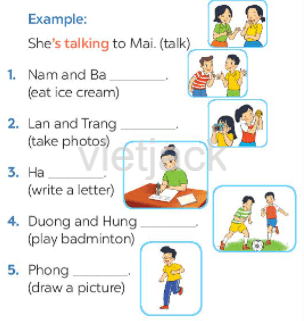Cung cấp dạng động từ đúng, khẳng định hoặc phủ định
Điền vào dạng đúng của động từ, khẳng định hay phủ định
Cung cấp dạng động từ đúng, khẳng định hoặc phủ định
Điền vào dạng đúng của động từ, khẳng định hay phủ định
VII. Complete the sentences with the Present Continuous form of the verb in brackets. They can be positive (+), negative (-) or questions (?). Use contractions where you can.
0 Vicky is starting (start) at a new school next Monday. (+)
1 I ________________ (take) the train to work tomorrow for a change. (+)
2 Beatrice and Camille _____________ (sing) in the school concert this year. (–)
3 ________________ (Wesley come) to the party on Saturday? (?)
4 My brothers ____________ (give) me a lift to the football match tomorrow. (–)
5 ________________ (we stay) at home tonight or going out? (?)
6 Vanda ________________ (travel) to France next month for her job. (+)
7 My grandparents _________ (spend) the summer holiday with us this year. (–)
2. Look at the pictures. Write sentences like the example. Use positive or negative present continuous verbs.

làm hộ mình mn ơi
I. THE PAST SIMPLE: (THÌ QUÁ KHỨ ĐƠN) Positive Form( thể khẳng định: +Có động từ:
+có tobe:
Negative form ( phủ định) : +có động từ:
+ có tobe:
Question form( thể câu hỏi): + có động từ:
+có tobe: |
VII. Supply the correct form of the words. (1 pt)
31. People in Ho Chi Minh city are very ________________. (friend)
32. There’s a _________________ castle in the city centre. (beauty)
33. Lots of animals are in __________. (dangerous)
34. Sandra is the ____________ player in the basketball team. (good)
VII. Supply the correct form of the words in parentheses.
31. We must (take) ____________ an umbrella. It (rain) _____________.
32. The weather is becoming (cold) ______________.
33. He (stay) ______________there for two days when he comes there.
34. My best friend (write) _________________ to me every week.
35. You can borrow my umbrella. I (not need) ____________________it at the moment
Instructions: Complete the sentences about the Amish community. Use the correct affirmative or negative form of the verbs below.
Hoàn thành các câu về cộng đồng người Amish. Sử dụng hình thức khẳng định hoặc phủ định đúng của các động từ dưới đây.
do finish get go go have prepare start use
1. The children don't go to school when they are fifteen years old.
2. Amish men and women ... work early in the morning and ... work in the evening.
3. Amish people ... computers.
4. The men ... the housework.
5. People ... up early in Amish communities.
6. The women ... food during the day.
7. The men ... dinner alone.
8. The Amish ... to bed very late.
Thanks.
VII. Write sentences, using the words given with the correct form of the adjectives.
1. Which/ dry/ Sahara Desert/ or/ Atacama Desert?
________________________________________________________________
2. Cat Ba Island/ large/ island/ Ha Long Bay
________________________________________________________________
3. The Mekong River/ long/ river/ Vietnam
________________________________________________________________
4. Angel Falls/ Venezuela/ high/ waterfall/ the world.
________________________________________________________________
5. The Amazon River/ wide/ the Nile River
________________________________________________________________
6. Ayers Rock/ famous/ landmark/ Australia
________________________________________________________________
7. Vietnamese people/ often/ clean/ decorate/ houses/ Tet.
________________________________________________________________
8. The air / the city / polluted / the air / the countryside.
1] make the present simple.choose positive ,negative or question
1][he/drive to work every day]
I. Supply the correct form or tense of the verbs in the brackets.
1. Our friends (come) here soon.
2. My father never (drink) coffee.
3. I usually to school by bike but tomorrow I to school by bus. (go)
4. He (visit) his grandparents next week.
5. Jane (play) the piano at present.
6. We (not invite) many friends to the party tonight.
7. I (be) rich someday.
8. Hurry up! We (wait) for you.
I. Supply the correct form or tense of the verbs in the brackets.
1. Our friends (come) here soon.
2. My father never (drink) coffee.
3. I usually to school by bike but tomorrow I to school by bus. (go)
4. He (visit) his grandparents next week.
5. Jane (play) the piano at present.
6. We (not invite) many friends to the party tonight.
7. I (be) rich someday.
8. Hurry up! We (wait) for you.